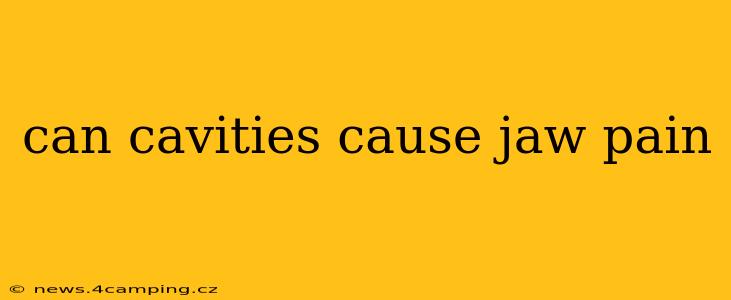Jaw pain is a common complaint, and while many things can cause it, the surprising answer is yes, cavities can sometimes contribute to jaw pain, albeit indirectly. It's not a direct cause-and-effect relationship like a toothache, but the consequences of untreated cavities can certainly lead to discomfort in your jaw. Let's explore the connection.
How Cavities Might Lead to Jaw Pain
Cavities, or dental caries, are holes in your teeth caused by tooth decay. This decay weakens the tooth structure, and if left untreated, it can lead to several problems that may manifest as jaw pain:
-
Severe Toothache: An untreated cavity can progress to a significant toothache. This intense pain can cause you to clench or grind your teeth unconsciously, leading to temporomandibular joint (TMJ) disorders and subsequent jaw pain. The constant pressure and strain on the jaw muscles and joints from this clenching are significant contributors.
-
Abscess Formation: A severely decayed tooth can become infected, forming an abscess. An abscess is a pocket of pus that develops at the root of the tooth. The infection and inflammation can spread, putting pressure on surrounding tissues, including the jawbone and muscles, causing significant pain.
-
Tooth Loss: In the most advanced stages of decay, a tooth may become so weakened that it breaks or falls out. This loss of a tooth can disrupt the natural bite alignment, leading to uneven pressure on the jaw joint and resulting in pain. The body may also compensate for the missing tooth, creating muscle imbalances that manifest as jaw pain.
Can Cavities Cause Jaw Pain Directly?
No, cavities themselves do not directly cause jaw pain. The pain you feel in your jaw is usually a consequence of the complications arising from an untreated cavity. The pain stems from the body's response to the infection, inflammation, or the stress caused by altered bite mechanics.
What Other Symptoms Might Accompany Jaw Pain from Cavities?
Besides jaw pain, other symptoms indicating a potential link to cavities include:
- Toothache: Sharp, throbbing pain in the affected tooth.
- Sensitivity to Hot or Cold: Increased sensitivity when consuming hot or cold foods or drinks.
- Swelling in the Gums or Face: This could indicate an infection.
- Bad Breath: A persistent unpleasant smell could point to an infection.
- Difficulty Chewing: Pain or discomfort when chewing could indicate an issue with the tooth or jaw.
How to Address Jaw Pain Potentially Related to Cavities
If you suspect your jaw pain might be linked to untreated cavities, it's crucial to see a dentist immediately. They can diagnose the underlying cause and recommend appropriate treatment. Treatment options for cavities range from simple fillings to root canals or, in severe cases, tooth extraction. Early intervention is key to preventing more serious complications and alleviating jaw pain.
Are there other causes of jaw pain?
Yes, many other conditions can cause jaw pain, including temporomandibular joint (TMJ) disorders, bruxism (teeth grinding), arthritis, and sinus infections. A proper diagnosis is essential to identify the specific cause and receive appropriate treatment. Don't self-diagnose; seek professional help.
When should I see a dentist about jaw pain?
You should consult a dentist if you experience jaw pain, especially if it's accompanied by other symptoms like toothache, swelling, or difficulty chewing. Prompt diagnosis and treatment are crucial to prevent further complications.
This information is intended for educational purposes only and does not replace professional medical advice. Always consult with a qualified healthcare provider for any health concerns or before making any decisions related to your health or treatment.
